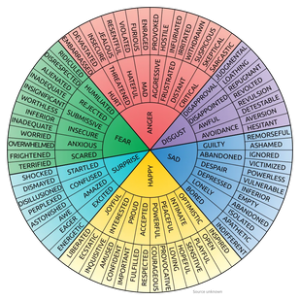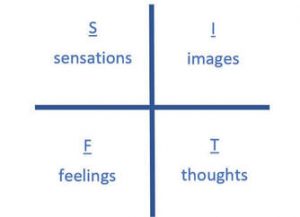The Miracle of Teen Feelings
This could apply to all humans really, but my passion and purpose are all about helping teen girls build bulletproof mindsets and believe in themselves, so I’m writing for you today.
Feelings (emotions) can fill your heart with love and joy, steady your body with calm relaxation, or claw at your chest with heart rippling anxiety. Feelings can be raw, intense, and totally hijack your body and brain.

Photo by Orkun Azap on Unsplash
Even though they can be pretty powerful at times, your feelings are also a practical and important barometer (measurement tool) for how you are doing in any given moment. They give so much information and if you can be curious enough to learn about them, they can be a guide to your inner world and what you are needing.
Here are 5 things you must know about feelings:

Photo by Ilya Shishikhin
1. UNDERSTANDING THE EMOTION:
THOUGHT-BEHAVIOUR LINK
Feelings are the body’s response to your thoughts. Feelings can seem like they are happening in response to something outside of you like a breakup, a test, a fight with a friend, etc. The truth is that it is not the situation or event that causes the feeling. It is actually the mental filter which it is interpreted through. So the mental filter (your thoughts about the thing) which you see a situation through leads to the feelings you experience.
You may not feel a lot of emotion if I tell you that Sarah is no longer best friends with Jude, but if it is you that is no longer friends with your best friend, you will probably have a lot of feelings about this. The meaning we give to situations and events cause our feelings. Why is this important to know this? Well it means anytime you are feeling a feeling you can check-in with yourself by asking:
What is the story I am telling myself right now (e.g. I’m not a good friend, I’m not smart enough, I will screw this up, I am strong, I can always try again, I am a good friend)?

Photo by Robina Weermeijer on Unsplash
2. NAME IT TO TAME IT
When something is unknown or uncertain, our human brains see it as a threat of danger. The danger can be physical, but it can also be emotional or psychological danger. So if you don’t know what you are feeling or you are not sure how to express that feeling, you might end up getting totally overwhelmed. Being able to name your feelings might sound way too simple to make any difference, but it can really help your mind and body start to feel better.
I like to use the emotion wheel below as a tool to practice this skill. You can start at the centre (these are the 6 primary emotions that have been researched and pretty much found globally across cultures and ages.) They are Happy, Angry, Scared, Disgusted, Sad and Surprise. Then from there you can branch out to other feelings that might help you better understand how you are feeling in that moment.
I like to print it out and have it around. You can circle different feelings that you notice coming up for you often.

3. OBSERVE YOUR FEELINGS
It can be really easy to get caught up in your thoughts and feelings, kind of like being swept up by a storm. Once you calm down or it is over, do you ever realize that you can look back and see things much more clearly?
Imagine your thoughts and feelings like a big aquarium full of sea life. When you are caught up in your thoughts and feelings it is like swimming in the aquarium along with all of the sea life. It can feel pretty overwhelming to imagine swimming in the water with sharks and stingrays beneath you! (Did I mention the aquarium was really big?)
Being able to observe your feelings and taking a step back can give you a whole new perspective. It is like standing outside of the aquarium and looking in. All of the sea life is still there (your thoughts and feelings), but you can now look at it with curiosity instead of overwhelm. It often opens up the possibility of choice on what you want to do and how you want to respond when you are observing your feelings.

Photo by Silas Hao on Unsplash
One exercise that can help you practice observing your feelings is an exercise introduced by Daniel Siegel, called SIFT. You divide a piece of paper into 4 (see below) and take 1-2 minutes to write or list anything you notice. Start with sensations and work your way through.
Sensations – Any body sensations you are noticing in this present moment (e.g. tense, tight, tingling, numb, warm, cold, shaky, etc.)
Images – Any images that you are noticing. Some people see them as pictures, moving images like a movie, colours, shapes, symbols, or nothing at all. All of these are ok!
Feelings – Any feelings or emotions you are noticing in this moment. It may be one dominant feeling, or different feelings mixed together.
Thoughts – Any thoughts you are having right now. They can be repetitive thoughts, questions or random thoughts. Anything goes!

4. YOUR BODY CAN SOMETIMES FOOL YOU
Your brain and body are pretty amazing. They take in everything that is happening in your environment – what you see, feel, hear, smell, and taste – and within fractions of seconds, decide if things are safe, dangerous, good, bad, liked or disliked.
The thing is our brain can’t tell the difference between an actual situation and a thought. Weird right?! Meaning we can think ourselves into worry (and other emotions) and our body will feel it like a real danger or threat.
Next time you feel worried, scared, or anxious yourself: Am I in real danger at this moment? What is the evidence for this? Then take a couple slow breaths and see how you’re doing.

Photo by Evelyn Paris on Unsplash
5. THE POWER OF FLOW
The more you resist a feeling, the more it will keep coming back. The expression “what we resist persists” means that if you try to avoid anxiety or ignore anger, it gets bottled up until it basically explodes in ways you are not meaning to. Allowing yourself to feel what you’re feeling helps it flow through instead of getting stuck.
Think of your emotions like houseguests. If your anger houseguest comes to the door and you pretend like you’re not home, anger keeps knocking. Then anger knocks louder and maybe starts trying to find other ways to get it. Your feelings are like really persistent houseguests. Or you may have your joy houseguest that comes by and you invite in and you never want it to leave. Eventually joy is like, “I need to go home now” and you may cling to it and ask it to stay just 5 minutes more.
Learning that feelings come and go constantly is important, and if you allow them to stop by and hang out for a while, they always leave.

Photo by Seyedeh Hamideh Kazemi on Unsplash
I love this translated poem, written by Rumi –
This being human is a guest house.
Every morning a new arrival.
A joy, a depression, a meanness,
some momentary awareness comes
as an unexpected visitor.
Welcome and entertain them all!
Even if they’re a crowd of sorrows,
who violently sweep your house
empty of its furniture,
still, treat each guest honorably.
He may be clearing you out
for some new delight.
The dark thought, the shame, the malice,
meet them at the door laughing,
and invite them in.
Be grateful for whoever comes,
because each has been sent
as a guide from beyond.
You are the miracle that is a Teen and I feel so honoured to write to you today. Here’s to hoping your feelings can be your guide.
Love,
Chantal
If you found this post helpful, pass it on by emailing a friend or sharing it on Twitter or Facebook – Thanks!
– Chantal Côté, R.Psych, Pyramid Psychology – helping older children, teens, and young adults learn how to build bulletproof mindsets.
 Chantal Côté (she/her) is a psychologist and teen life coach living in Calgary, Alberta. After over a decade in non-profit and community mental health, Chantal started Pyramid Psychology, a practice dedicated to supporting teens – a population she is constantly amazed by. Chantal is on a mission to help 100,000 teen girls (and their parents) build bulletproof mindsets so they can weather the ups and downs of life. As part of this goal, Chantal has had the privilege of speaking at various events – virtual and live – to support teens and parents.
Chantal Côté (she/her) is a psychologist and teen life coach living in Calgary, Alberta. After over a decade in non-profit and community mental health, Chantal started Pyramid Psychology, a practice dedicated to supporting teens – a population she is constantly amazed by. Chantal is on a mission to help 100,000 teen girls (and their parents) build bulletproof mindsets so they can weather the ups and downs of life. As part of this goal, Chantal has had the privilege of speaking at various events – virtual and live – to support teens and parents.
Outside of this passion, Chantal is often in nature, writing poetry, playing ball hockey and hanging out with her loved ones.
Each week, Chantal writes a blog article in response to issues she hears from the parents and teens she connects with. If you have something you’d like to read more on – email ideas and questions to info@pyramidpsychology.com or DM us via Instagram or Facebook.








